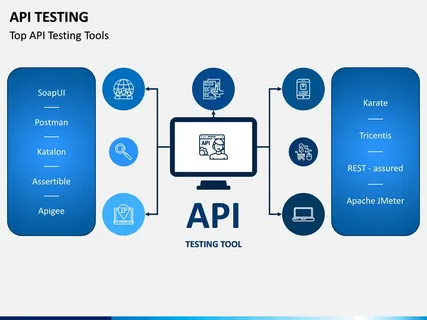API Testing Tools: Ensuring Robust, Scalable, and Secure APIs
In today’s interconnected software ecosystem, Application Programming Interfaces (APIs) play a crucial role in enabling communication between different services, platforms, and applications. APIs are the backbone of modern web development, facilitating interactions across cloud systems, mobile apps, microservices, and more. However, to ensure APIs work as expected, maintain performance, and provide a secure connection, API testing is a critical phase of the development lifecycle.
API testing involves verifying that APIs meet functionality, reliability, performance, and security requirements. This process ensures that APIs perform as intended before they’re released into production, preventing errors, data breaches, and security vulnerabilities. Fortunately, several API testing tools are available that streamline and automate this process, enabling developers and quality assurance teams to identify issues efficiently.
This article will explore the importance of API testing, the different types of API tests, and some of the most popular API testing tools available today.
Why is API Testing Important?
API testing is essential for several reasons:
- Ensuring Functionality: APIs are often the primary method through which applications interact with each other. If an API doesn’t function as expected, it can disrupt the entire application ecosystem. Testing ensures that the API performs the intended actions—such as retrieving data, handling requests, and performing calculations—correctly.
- Performance and Load Testing: APIs need to be able to handle various traffic loads without slowing down or crashing. Performance testing helps ensure that an API can handle a high volume of requests while maintaining stability and responsiveness.
- Security: APIs are common targets for attacks, such as data breaches, denial of service (DoS), and SQL injection. API testing tools help identify and mitigate vulnerabilities before they can be exploited in a live environment.
- Data Integrity and Validation: APIs often involve complex data exchanges, and it’s crucial to validate that the data passed between different systems is correct. Testing ensures that data integrity is maintained throughout the transaction.
- Compliance: For APIs that handle sensitive or regulated data (such as healthcare or financial information), testing ensures that the API complies with industry standards, such as GDPR or HIPAA, preventing legal and regulatory issues.
Types of API Testing
There are various types of API testing, each focused on a specific aspect of API functionality. The main types include:
1. Functional Testing
Verifies that the API performs the expected functionality according to the requirements. It involves testing individual API endpoints and ensuring they return the correct responses.
2. Load Testing
Determines how well an API can handle an expected volume of traffic. This type of testing helps identify performance bottlenecks and ensure the system can scale effectively under stress.

3. Security Testing
Focuses on identifying vulnerabilities in the API, such as data breaches, unauthorized access, and encryption flaws.
4. Regression Testing
Ensures that updates or changes to the API do not break existing functionality. After code changes or new feature implementations, regression testing confirms that the API still works as expected.
5. Compatibility Testing
Ensures that the API works across different platforms, devices, operating systems, and network environments.
6. Mock Testing
Uses mock data and environments to simulate how the API behaves without connecting to the actual external services or databases, which helps in isolated testing.
Popular API Testing Tools
There are numerous API testing tools available, ranging from simple, user-friendly applications to complex enterprise solutions. Some of the best tools available for API testing today include:
1. Postman
Postman is one of the most widely used API testing tools. It offers a user-friendly interface for making API requests, writing tests, and debugging API responses. It supports RESTful APIs and offers features for functional, regression, and load testing.
- Key Features:
- Intuitive GUI for building and sending API requests.
- Supports REST, SOAP, and GraphQL APIs.
- Automatic testing capabilities using JavaScript.
- Collection runner for batch testing.
- Monitoring and alerting for continuous integration (CI) workflows.
- Detailed reports and logs for debugging.
- Best For: Developers and testers looking for a simple yet powerful API testing tool that works across various API types.
2. SoapUI
SoapUI is a comprehensive API testing tool primarily used for testing SOAP and REST APIs. It offers advanced features for functional testing, security testing, and load testing, making it ideal for enterprise-level applications.
- Key Features:
- Supports both REST and SOAP APIs.
- Advanced security and penetration testing.
- Data-driven testing with external data sources like CSV and Excel files.
- Mock services to simulate API behavior before the actual API is available.
- Integration with CI/CD tools like Jenkins for automated testing.
- Best For: Enterprises or teams working with both SOAP and REST APIs who require detailed functional and security testing capabilities.
3. JMeter
Apache JMeter is an open-source tool designed for performance and load testing of APIs, web services, and applications. Although it’s often used for testing the performance of web applications, it’s also highly effective for testing APIs under varying loads and stress conditions.
- Key Features:
- Can simulate heavy traffic to test the scalability and performance of APIs.
- Provides detailed performance metrics, such as response times, throughput, and error rates.
- Supports various protocols, including HTTP, SOAP, REST, and JDBC.
- Integration with CI/CD pipelines for automated load testing.
- Best For: Developers and QA engineers who need to perform extensive load and stress testing on APIs.
4. Insomnia
Insomnia is an API testing tool designed for testing REST, GraphQL, and gRPC APIs. It offers a clean interface, great for developers who need to quickly test endpoints and check the functionality of APIs. It is often appreciated for its simplicity and speed.
- Key Features:
- Supports REST, GraphQL, gRPC, and WebSocket.
- Easy-to-use interface for sending HTTP requests.
- Authentication support for APIs with API keys, OAuth 2.0, and others.
- Environments for managing different API endpoints across various setups.
- Integrations with CI/CD pipelines.
- Best For: Developers who need a lightweight tool for day-to-day API testing with support for multiple protocols.
5. Katalon Studio
Katalon Studio is an all-in-one test automation solution that supports API, web, and mobile testing. It provides an intuitive, drag-and-drop interface and is suitable for both beginners and experienced testers. It integrates with tools like JIRA, Jenkins, and Git for a smooth testing process.
- Key Features:
- Supports REST and SOAP APIs.
- Automation of functional, regression, and security testing.
- Built-in reports and logs for analysis.
- Supports data-driven testing using external data sources.
- Integration with CI/CD tools for continuous testing.
- Best For: Teams looking for an easy-to-use, automated testing solution that works for API testing as well as web and mobile applications.
6. ReadyAPI (by SmartBear)
ReadyAPI is a powerful, enterprise-grade API testing tool that provides comprehensive solutions for functional testing, security testing, and load testing. It is part of the SmartBear suite and offers more advanced capabilities than its sibling tool, SoapUI.
- Key Features:
- Advanced functional, performance, and security testing.
- Ability to create and run automated tests in parallel.
- Powerful API mocking and virtualization.
- Data-driven testing with data sources like Excel or SQL.
- Integration with CI/CD tools like Jenkins, Bamboo, and TeamCity.
- Best For: Enterprise-level testing needs that require advanced API testing capabilities, including security and performance testing.
7. Apigee
Apigee is a Google Cloud product that offers an API management and testing platform. While it’s more commonly used for managing APIs, Apigee also provides tools for testing API performance, security, and usage analytics.
- Key Features:
- Comprehensive API management, including analytics, security, and monitoring.
- API testing for load, performance, and security.
- Supports RESTful APIs and integrates with various services and platforms.
- Real-time analytics and insights into API usage.
- Integration with CI/CD pipelines.
- Best For: Teams and enterprises looking for a comprehensive solution for both managing and testing APIs in production environments.
Conclusion
API testing is an essential aspect of software development, ensuring that APIs perform reliably, securely, and at scale. With a variety of API testing tools available, developers and QA teams can choose the tools best suited to their specific needs, whether that’s ensuring functional correctness, testing under load, or securing sensitive data.
From beginner-friendly tools like Postman and Insomnia to enterprise-grade solutions like ReadyAPI and SoapUI, the right API testing tool can significantly improve the efficiency and quality of API development. By automating and streamlining the testing process, these tools help teams detect issues early in the development lifecycle, ultimately leading to more robust, secure, and performant APIs.

